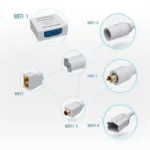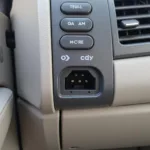Your OBD2 tool is essential for diagnosing and potentially fixing your car troubles. But what happens when this tool, your window into your car’s health, keeps losing connection? This frustrating issue can turn a quick check-up into a time-consuming ordeal. Don’t worry, this article will guide you through the common causes of why your OBD2 tool keeps losing connection and provide effective solutions to get you back on track.
Why Does My OBD2 Tool Keep Disconnecting?
Several factors can cause your OBD2 tool to lose connection. Let’s break them down:
1. Issues with the OBD2 Port
The OBD2 port itself can be the root of the problem.
- Dirty or Damaged OBD2 Port: Dust, dirt, or debris can accumulate inside the port, obstructing the connection. Similarly, bent or damaged pins within the port can prevent proper contact.
- Loose Connection: A loose connection between the OBD2 tool and the port can lead to intermittent disconnections, especially if the vehicle vibrates during operation.
2. Faulty OBD2 Tool or Cable
Sometimes, the culprit isn’t your car, but the tool itself.
- Damaged OBD2 Cable: A frayed, cut, or internally damaged cable can disrupt the flow of information, leading to connection drops.
- Faulty OBD2 Tool: Internal problems within the OBD2 scanner, like a failing Bluetooth chip or outdated software, can cause connectivity problems.
3. Vehicle-Related Issues
The problem might be deeper than just the port or the tool.
- Weak Car Battery: A weak or dying car battery can interrupt the power supply to the OBD2 port, causing disconnections, especially during engine cranking.
- Vehicle Software Issues: In some cases, software glitches within the vehicle’s computer system can interfere with communication to the OBD2 port.
4. Compatibility Issues
Ensure your OBD2 tool is compatible with your vehicle’s make, model, and year. Using an incompatible tool can lead to communication errors and connection problems.
How to Fix an OBD2 Tool That Keeps Losing Connection
Now that you understand the potential culprits, let’s explore the solutions:
1. Check and Clean the OBD2 Port:
- Inspect the Port: Visually examine the OBD2 port for any dirt, debris, or bent pins.
- Clean the Port: Use compressed air or a cotton swab dipped in isopropyl alcohol to gently clean the inside of the port. Allow it to dry completely before plugging in your OBD2 tool.
2. Inspect and Test the OBD2 Tool and Cable:
- Examine the Cable: Check the entire length of the OBD2 cable for any visible damage, such as cuts, frays, or loose connections.
- Test with Another Cable: If you suspect a cable issue, try using a different OBD2 cable to rule out a faulty cable.
- Test with Another Vehicle: Connect your OBD2 tool to a different vehicle to see if the connection issue persists. If it does, the problem likely lies with the tool itself.
3. Address Vehicle-Related Issues:
- Check the Battery: Test your car battery’s voltage. If it’s low, charge or replace the battery as needed.
- Consult a Mechanic: For suspected software issues, it’s best to consult with a qualified mechanic who can diagnose and address any underlying vehicle software problems.
4. Ensure Compatibility:
- Verify Compatibility: Double-check that your OBD2 tool is compatible with your vehicle’s make, model, and year. Refer to the tool’s documentation or the manufacturer’s website for compatibility information.
- Update Tool Software: If available, update your OBD2 tool’s software to the latest version to ensure optimal performance and compatibility.
Still Having Trouble?
Experiencing persistent OBD2 connection issues can be frustrating. If you’ve tried the troubleshooting steps above and your OBD2 tool still keeps losing connection, don’t hesitate to seek professional assistance.
“Remember,” says John Smith, Senior Automotive Diagnostic Technician at XYZ Auto Repair, “a reliable connection is crucial for accurate vehicle diagnostics. If your OBD2 tool keeps disconnecting, it’s important to address the issue promptly to avoid potentially misinterpreting data or overlooking underlying car problems.”
Contacting a qualified mechanic or an automotive electrician can provide expert diagnosis and solutions tailored to your specific vehicle and OBD2 tool.
FAQs: OBD2 Tool Losing Connection
1. Why does my OBD2 Bluetooth adapter keep disconnecting?
Bluetooth connectivity issues can be due to interference from other devices, distance limitations, or problems with the Bluetooth module in either the OBD2 adapter or your device. Try moving closer to your car, disabling other Bluetooth devices, or resetting the Bluetooth connection.
2. Does a bad fuse cause OBD2 problems?
While a blown fuse related to the OBD2 port is uncommon, it’s worth checking the fuse box for any blown fuses. Refer to your vehicle’s owner’s manual to locate the correct fuse for the OBD2 port.
3. Can a low battery cause my OBD2 scanner to not connect?
Yes, a weak or dying car battery can disrupt power supply to the OBD2 port, leading to connection problems. Ensure your car battery is adequately charged.
4. Why does my OBD2 scanner say “Link Error”?
A “Link Error” usually signifies a communication problem between the OBD2 scanner and the vehicle’s computer. This could be due to a faulty cable, incompatible tool, or issues with the vehicle’s OBD2 system.
5. Should I disconnect my car battery when installing an OBD2 scanner?
In most cases, disconnecting the car battery is not necessary for installing an OBD2 scanner. However, it’s always a good practice to consult your vehicle’s owner’s manual or contact the manufacturer for specific instructions.
Need More Help?
We understand that dealing with car troubles can be stressful. If you need further assistance with your OBD2 tool or have any other car-related questions, please don’t hesitate to reach out to our team of experts.
Contact us:
WhatsApp: +1(641)206-8880
Email: [email protected]
Our dedicated customer support team is available 24/7 to provide you with the guidance and solutions you need.


